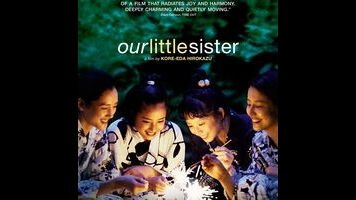Among Japanese directors, past and present, Hirokazu Kore-eda wrestles with the great Yasujirô Ozu for the title of “most gentle and serene” (though the two would be more apt to sigh wistfully at each other than do any actual wrestling). Even by Kore-eda’s standards, though, Our Little Sister is unusually placid. In part, that’s due to the nature of the source material: The film was adapted from a popular serialized manga called Umimachi Diary, which has been running since 2007 (and is still in progress; the most recent volume was released in January, eight months after Our Little Sister premiered at Cannes 2015). The story was low-key and anecdotal to begin with, and Kore-eda has chosen to omit many of its spikier aspects; it’s as if he loves the characters so much that he can’t bear to put through them any significant turmoil. As a result, the movie version feels a tad weightless, especially relative to its hefty running time. Anyone in the mood for two hours (and change) of sheer, unadulterated loveliness, however, will be amply rewarded.
Kore-eda’s Nobody Knows (2004) derived pathos from a group of abandoned children. It’s easy, then, to understand what attracted him to Umimachi Diary, whose three main characters likewise had to fend for themselves from an early age. Now in their 20s, Sachi (Haruka Ayase), Yoshino (Masami Nagasawa), and Chika (the uni-monikered Kaho) still live together in their childhood home, years after Dad ran off with another woman and Mom, unable to cope with the shame, also took a powder. Their lives are pleasant and uneventful until word arrives that their father has died, setting in motion a major change that will render everything… pretty much equally pleasant and uneventful. Attending the funeral, strictly out of a sense of duty, Sachi meets, for the first time, their half-sister, Suzu (Suzu Hirose), and impulsively invites the teenager to come live with her and her sisters in Kamakura. The rest of the movie simply details the slight adjustments these four women subsequently make, as the youngest sister settles into her new family.
Abandon hope, all ye who seek narrative intrigue, or even fairly basic conflict. (Mom does eventually reappear, causing tempers to flare momentarily.) From moment to moment, though, Our Little Sister is so thoroughly winning that its total lack of momentum barely registers as a liability. Kore-eda coaxes relaxed yet sharply drawn performances from the four young lead actors (supported by old pros like Kirin Kiki and Lily Franky), and his screenplay, condensed from what was then six volumes of the manga, teems with absorbing details (e.g., the arduous process of making plum wine) and indelible images (like Suzu’s sort-of boyfriend taking her on a bike ride through a “tunnel” that turns out to be a canopy of cherry blossoms). The film eventually feels overlong, and it could use some bite to offset the insistent sweetness—there’s way too much dialogue in which the sisters discuss how much they love each other, sentiments that come across just fine without being spoken. But charming is charming.








































